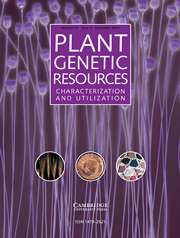Article contents
Identification of Hydrangeaceae accessions of wild origin from Jeju, Korea, using molecular markers
Published online by Cambridge University Press: 24 September 2010
Abstract
Hydrangea and Schizophragma are popular horticultural and ornamental plants. This study was designed to identify unknown accessions of Hydrangeaceae that have leaf morphological characters different from Hydrangea anomala subsp. petiolaris and Schizophragma hydrangeoides in Jeju, Korea. A total of 29 accessions of Hydrangea and Schizophragma from the wild were collected and analyzed using randomly amplified polymorphic DNA (RAPD) and single nucleotide polymorphisms (SNPs) from the ribulose-1, 5-bisphosphate carboxylase/oxygenase large subunit (rbcL) gene. Morphological characteristics of leaves and shoot apices of several accessions were also examined. Based on the RAPD markers, SNPs of the (rbcL) gene and morphological characteristics of apical buds, the unknown accessions were identified as H. anomala var. petiolaris.
Keywords
Information
- Type
- Research Article
- Information
- Copyright
- Copyright © NIAB 2010
References
- 4
- Cited by

